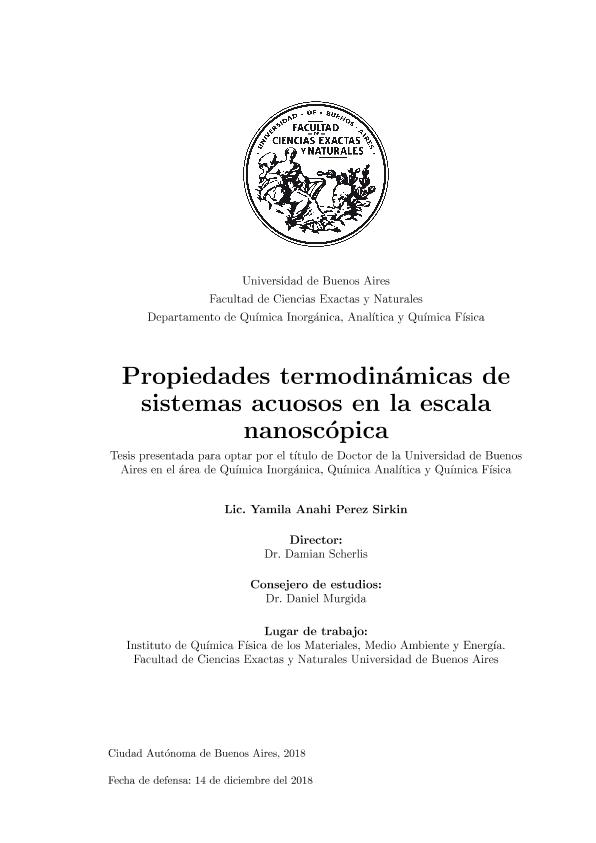Tesis doctoral
Thermodynamic properties of aqueous systems in nanoscopic scaleIn the present thesis, the thermodynamical properties of aqueous systems in the nanos-cale regime were investigated. In particular, the following phenomena were analyzed: i)the vapor pressure of water-ions systems, from the macroscopic scale to aggregates ofonly a few particles. ii) The nucleation of bubbles on nanoelectrodes. iii) The effect ofconfinement on the water dissociation constant.The GCS (Grand Canonical Screening) methodology, which has been developed in ourgroup before this thesis, allows us to obtain the vapor pressure of systems that havea liquid-vapor interface. In the present thesis, this methodology has been modified inorder to study the vapor pressure of systems without an interface, with the purpose ofapplying it to more complex systems, like fuel cells. The effect of electrolytes on thevapor pressure of water has been studied from both the experimental and theoreticalpoints of view in the case of bulk systems, however the resolution of the experiments fornanoaggregate does not allow a description on the microscopic scale, and is the cause ofone of the greatest uncertainties in atmospheric predictions. In this context, we studythe ability of different models, both atomistic and coarse-grained, to predict the vaporpressure of systems of just a few molecules.The nucleation of nanobubbles on nanoscopic electrodes has been frequently studiedin recent decades, not only for its relevance from a chemical-physics standpoint, whichleaves many open questions regarding the nucleation mechanism and the stability, butalso because of its importance in the design and optimization of electrocatalytic tech-nologies. In this thesis, this phenomenon has been studied through molecular dynamicssimulations with coarse-grained models in collaboration with an experimental group atThe University of Utah.Different authors have speculated on how confinement can affect the autodissociation ofwater, but this question has not yet been answered through experiments, and has beenscarcely addressed from simulations. Recent studies suggest an increase of the dissocia-tion constant in bidimiensional nanometric pores. In the present thesis, this effect hasbeen studied under a more extreme confinement, in particular in a (6,6) carbon nano-tube, where the opposite effect was observed.To study these problems, this thesis has used different classical, quantum, and QM-MMsimulation schemes, including the following open source software: LAMMPS, MCCCS-Towhee and Quantum Espresso. It has often been necessary to implement new featureswithin these programs, as well as different tools for data analysis . In the present thesis, the thermodynamical properties of aqueous systems in the nanoscale regime were investigated. In particular, the following phenomena were analyzed: i) the vapor pressure of water-ions systems, from the macroscopic scale to aggregates of only a few particles. ii) The nucleation of bubbles on nanoelectrodes. iii) The effect of confinement on the water dissociation constant. The GCS (Grand Canonical Screening) methodology, which has been developed in our group before this thesis, allows us to obtain the vapor pressure of systems that have a liquid-vapor interface. In the present thesis, this methodology has been modified in order to study the vapor pressure of systems without an interface, with the purpose of applying it to more complex systems, like fuel cells. The effect of electrolytes on the vapor pressure of water has been studied from both the experimental and theoretical points of view in the case of bulk systems, however the resolution of the experiments for nanoaggregate does not allow a description on the microscopic scale, and is the cause of one of the greatest uncertainties in atmospheric predictions. In this context, we study the ability of different models, both atomistic and coarse-grained, to predict the vapor pressure of systems of just a few molecules. The nucleation of nanobubbles on nanoscopic electrodes has been frequently studied in recent decades, not only for its relevance from a chemical-physics standpoint, which leaves many open questions regarding the nucleation mechanism and the stability, but also because of its importance in the design and optimization of electrocatalytic technologies. In this thesis, this phenomenon has been studied through molecular dynamics simulations with coarse-grained models in collaboration with an experimental group at The University of Utah. Different authors have speculated on how confinement can affect the autodissociation of water, but this question has not yet been answered through experiments, and has been scarcely addressed from simulations. Recent studies suggest an increase of the dissociation constant in bidimiensional nanometric pores. In the present thesis, this effect has been studied under a more extreme confinement, in particular in a (6,6) carbon nanotube, where the opposite effect was observed. To study these problems, this thesis has used different classical, quantum, and QM-MM simulation schemes, including the following open source software: LAMMPS, MCCCSTowhee and Quantum Espresso. It has often been necessary to implement new features within these programs, as well as different tools for data analysis .
Propiedades termodinámicas de sistemas acuosos en la escala nanoscópica
Título:
Thermodynamic properties of aqueous systems in the nanoscopic scale
Pérez Sirkin, Yamila Anahí

Director:
Scherlis Perel, Damian Ariel

Consejero de estudios:
Murgida, Daniel Horacio

Fecha de publicación:
14/12/2018
Idioma:
Español
Clasificación temática:
Resumen
Palabras clave:
Termodinamica
,
Agua
Archivos asociados
Licencia
Identificadores
Colecciones
Tesis(INQUIMAE)
Tesis de INST.D/QUIM FIS D/L MATERIALES MEDIOAMB Y ENERGIA
Tesis de INST.D/QUIM FIS D/L MATERIALES MEDIOAMB Y ENERGIA
Citación
Pérez Sirkin, Yamila Anahí; Scherlis Perel, Damian Ariel; Murgida, Daniel Horacio; Propiedades termodinámicas de sistemas acuosos en la escala nanoscópica; 14-12-2018
Compartir



